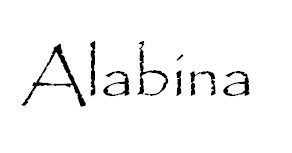- Alabina
Infobox musical artist
Name = Alabina

Img_capt = In this font, dotted i's look as though they carry accents
Img_size = 100px
Landscape = no
Background = group_or_band
Alias =
Origin =Israel
Genre = Middle Eastern
world
Arabic
French
Hebrew
Years_active =2000 –present
Label = Atoll Music
Profile Record
LoveCat Music
Associated_acts =Los Niños de Sara
URL = [http://www.alabina.info Official site]
Current_members =Ishtar
Los Niños de Sara Alabina is a Arabic-based group that performs a mix of world music: Middle Eastern, Arabic, French, Hebrew, and Spanish
Gypsy music .Although the name of the group is often written "Alabína," the accent on the "i" is an unnecessary addition. The mistake may be attributed to the group's use of the font Papyrus on its album covers. In this font, dotted i's look as though they carry accents.
Name
According to Alabina.org, the name Alabina has two meanings: "come to me" and "God is between us." The name comes from the title of Alabina's first song. It is also the name of the group's first album.
Group
Alabina is made of lead singer Ishtar, who does the female vocals, and the band
Los Niños de Sara , who provide male vocals and music.Ishtar
Ishtar was born and raised in
Israel . Her parents areMoroccan and Egyptian. She speaks and sings in Arabic, Hebrew, French, Spanish, and English; she also says she "half-speaks" "Moroccan." Ishtar began performing in clubs at age 15 and continued even in theIsraeli army , where she served as an helicopter technician. Though she was born Eti Zach, she chose the name "Ishtar ," a mesopotamian goddess, because her grandmother called her Ester, which "with her Egyptian accent it sounded like Ishtar," she said.As the lead singer of Alabina, Ishtar frequently sings in Arabic, complementing the Spanish of Los Niños de Sara. She often sings Arabic-style, with a wavering voice and trilling. She also sings Hebrew songs, sometimes songs from her childhood, only alone, however — not with Alabina. Occasionally she joins Los Niños in Spanish. On her own, she frequently sings French. Nine out of twelve songs in her album "The Voice of Alabina" are in French — and she has two songs in English: "C'Est La Vie My Baby" ("Truly (Emet)") and "Last Kiss" ("The Voice of Alabina").
Ishtar is frequently featured on Alabina album covers. She has dyed blond hair, which is sometimes curly, and dark brown eyes. She has been noted for her provocative dress in pictures and at concerts.
On her own, Ishtar has produced three albums: "The Voice of Alabina" (2000), "Truly (Emet)" (2003) and "Je sais d'où je viens" (2005). The first is mainly composed of French songs, the second is mostly in Hebrew, and Ishtar's last album is primarily in Arabic, with four songs in French, one in Spanish and significant chunks of English dispersed throughout.
Ishtar currently lives in France.
Los Niños de Sara
Los Niños de Sara (in Spanish, "Sara's children") are Spanish-speaking Gypsies from
Montpellier , France. The four cousins are named Antonio ("Tonio") (also written Antoine) Contreras, Ramón Compas, Santiago ("Santi") Lorente, and Coco. Though they speak both Spanish and French, they only sing in their native Spanish. Tonio, the lead male singer, plays guitar. In addition to all providing back-up vocals, Ramón and Santi play guitar and Coco plays percussion.On their own, Los Niños have produced two CDs: "La Cubanita" (2001) and "Gipsyolé" (2003). Their songs often speak of family, love, and God. Los Niños are
Catholic .Their birthdays are: Tonio, March 27; Ramón, January 7; Santi, September 4th; and Coco, September 5.
They currently live in
France .Music
Alabina's music mixes many styles, cultures, and languages: Middle Eastern, Spanish music, French,
raï , flamenco, gypsy, Arabic, and at times, Western pop. The group often takes older songs, for example, "Habibi Ya Nour El Ain," the popular Arabic song ofAmr Diab , and gives them new life, adding a mix of styles and languages and Alabina's own flavor. The new version, "Habibi de Mis Amores," in both Arabic and Spanish, is one example. Another example is "Lolole (Don't Let Me Be Misunderstood )," which Alabina turned into an upbeat Arabic-Spanish song, which though it can be recognized from the melody, is far from its original: a Western pop song in English. The song "Alabina" is well known in France for being the end credits music in the popular French comedies "La Vérité si je mens! " and "La Vérité si je mens! 2"Some of Alabina's most popular songs include:
*
Salma Ya Salama
*Alabina
*ChoukraneAlabina has produced several albums:
*Alabina (1996)
*The Album II (1998)
*Sahara (1999)
*L'Essentiel (2000)
*The Ultimate Club Remixes (2002)See also
*
Salma Ya Salama External links
* [http://alabina.org Alabina.org]
* [http://www.alabina.info Ishtar's official website]
* [http://www.lovecatmusic.com/releaseA.php?q=3712/ Los Ninos De Sara on LoveCat Music website]
Wikimedia Foundation. 2010.
